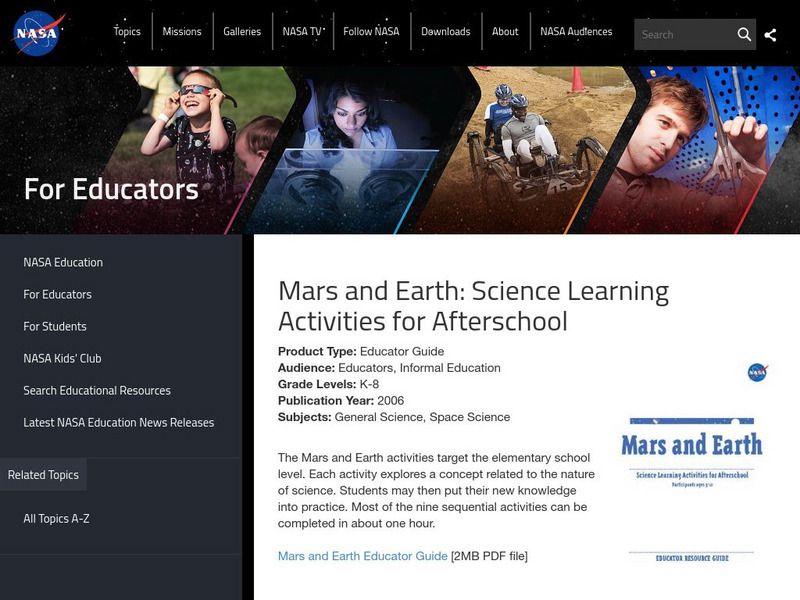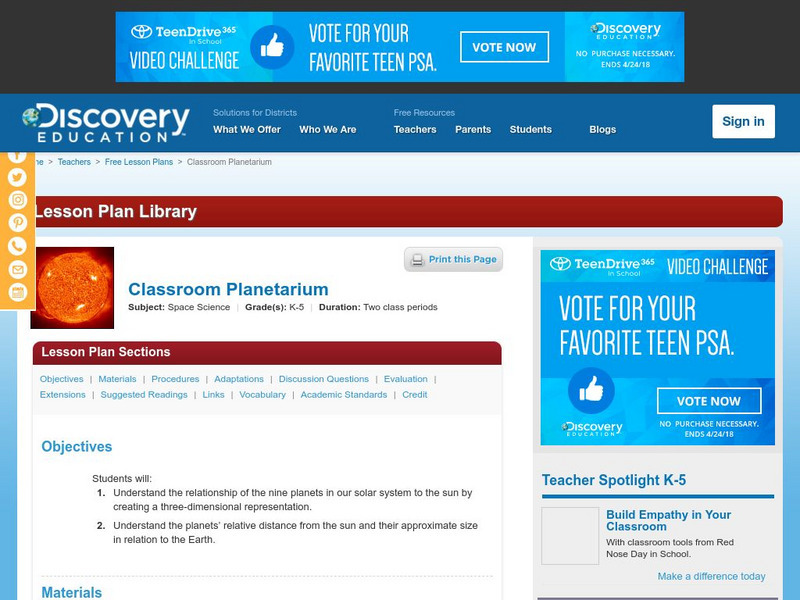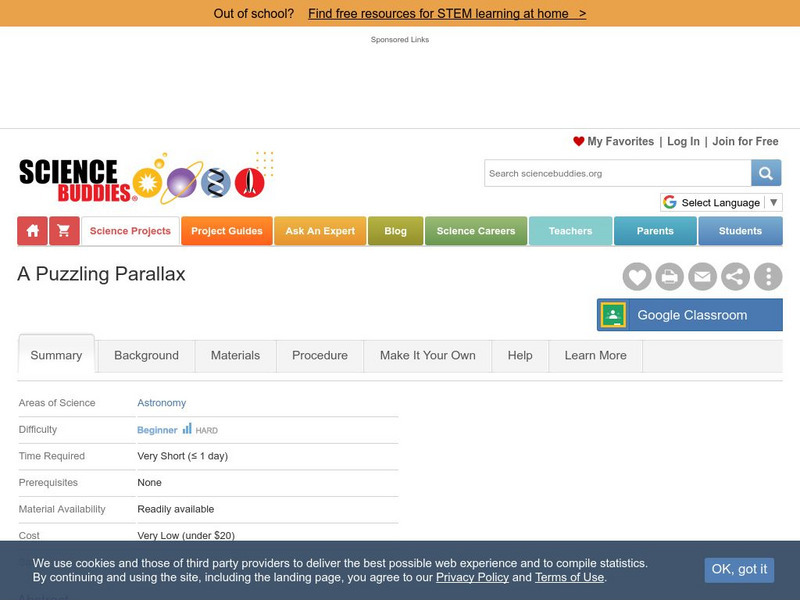Hi, what do you want to do?
Curated OER
The Guest Investigator Puzzle
Students conduct a brief astrophysics lab matching the EUVE spectra of various kinds of "mystery" stars with the spectra of known stars taken at Extreme Ultraviolet and optical wavelengths to determine their type.
Curated OER
The Path of the Sun, the Ecliptic
Young scholars are introduced to the ecliptic, the zodiac and the apparent motions of the Sun, Moon and planets across the sky.
Curated OER
The Path of the Sun: The Ecliptic
Students investigate the celestial sphere and the paths it takes in the solar system.
Curated OER
Collecting Electromagnetic Radiation
Students using different experiments and activities explore electromagnetic radiation and the effect on the Earth.
Curated OER
The Chinese Zodiac
High schoolers create their own personalized Zodiac page on a word processing
document after researching and discussing the origins of Zodiak signs. This lesson plan does include resource links and may be controversial.
Curated OER
The Discovery of the Solar System
Students explain the observed motion of the planets. The inner ones move back-and-forth across the position of the Sun, while the outer ones usually advance in one direction, but with occasional temporary reversals known as "retrograde...
Curated OER
The Vocabulary of Space
Students build their knowledge and understanding of vocabulary related to space. In this space instructional activity, students discuss four categories of words and phrases related to space.
Curated OER
Finding the Pole Star
Students study the constellations fo the Big Dipper and Cassiopeia and their use in finding the Pole Star. They realize that other celestial objects--Sun, Moon and planets--share the rotation (and hence rise and set), even though their...
Curated OER
Kepler's Third Law
Learners use Kepler's third law to derive the velocity in a circular orbit of any radius, and identify the Earth escape velocity.
Curated OER
Hubble Space Telescope Webquest
Students research the Hubble Space Telescope. In this Hubble Space Telescope lesson, students complete a webquest about the Hubble Space Telescope.
Curated OER
Meteors
Students identify the different types of meteorite using an interactive website. In this earth science lesson, students simulate how meteors crash on a surface. They relate meteor size to crater size.
Curated OER
Our Home in the Milky Way
Students gain appreciation of the vastness of our galaxy by viewing an applet about the Milky Way. Students hypothesize about how long it would take to get from Earth to Pluto.
Curated OER
Follow the Falling Meteorite
Students use triangulation method to locate meteorite landing site on the map. In this earth science lesson, students participate in a meteorite treasure hunt set up by the teacher. They explain how this method is used by scientists to...
Curated OER
Pinhole Viewer
Students make a pinhole viewer to demonstrate how it inverts light passing through it which produces inverted images.
Curated OER
Follow The Falling Meteorite
Students investigate the supposed traveling path of a meteorite. They use sound in order to triangulate the path. The results of the experiment are written on a map to display the path of the meteorite. The culminating activity is when...
NASA
Nasa: Mars and Earth: Science Learning Activities for Afterschool
This set of activities teaches students about the big picture of science using Mars as an example: how to collect data, use evidence, and look at models.
NASA
Nasa: Kepler: A Search for Habitable Planets: Transit Tracks
Classroom lesson plan for teaching astronomy uses PowerPoint presentations and illustrations of Kepler's light curves used to discover planets.
Smithsonian Institution
Smithsonian Learning Lab: The Universe, an Introduction
Start with the questions all students ask: How big is the universe, how far away are the planets and stars, how did they form and when, how do they move and why? Build on their natural curiosity. The Smithsonian, in cooperation with...
Discovery Education
Discovery Education: Classroom Planetarium
Create a classroom model of the solar system while teaching about relative size of all the planets, and each planet's distance from the sun.
Science Buddies
Science Buddies: A Puzzling Parallax
Did you know that ancient astronomers could measure the distance to other stars? They could also distinguish between stars and planets. How could they do that without modern technology of telescopes? See if you can discover the link...
South Carolina Educational Television
Know It All: Solar System Simulation
Fourth graders will begin to understand the solar system by using and creating models to demonstrate the layout of the solar System.
























